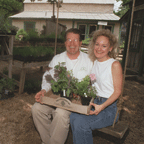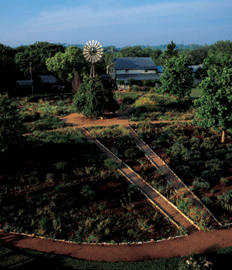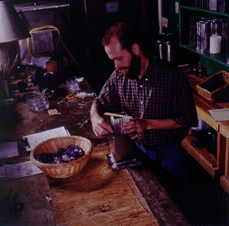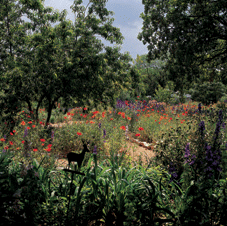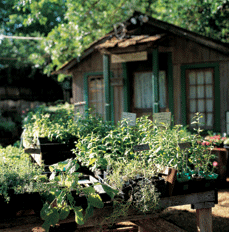Harvest Thyme
Text by Christopher Dow
Photos by Tommy LaVerrgne
Beyond the gate in the split-rail cedar fence is an enchanted world. Large pecan trees shade the small gravel parking lot from the Texas sun, and the air is redolent with fragrances of herbs and flowers. Straight ahead rests a cluster of rustic stone and wood buildings. To the right, spreads a delightful tapestry of herbs and flowers in a circular garden that nearly overflows a large sunlit field. Within the circle, the stone-bordered beds and walkways are laid out in a five-pointed star, though the pattern is readily apparent only to the birds that flutter about the top of the rose-covered windmill at the star’s center. From that vantage, they can see over the other gardens and buildings that rest on the grounds of this plant lover’s paradise called the Fredericksburg Herb Farm.
Established in 1991 by Sylvia and Bill Varney, the Fredericksburg Herb Farm has become a must-visit spot in this Texas Hill Country community. And no wonder. Every space, outside or in, is as visually appealing as it is aromatic. From the gardens to the quaint historic buildings to the garlands of drying herbs hanging from the ceilings inside, the whole place exudes charm and tranquility yet is vibrant with a sense of peaceful purpose.
Seeds
Growing up on Long Island and in New Hampshire, Sylvia Bennett White had no inkling that she would become one of America’s foremost herb experts. She transferred to Rice University from Barnard College in New York City in the middle of her sophomore year with entirely different plans. “I dreamed of being the next Perry Mason,” she says with a laugh. At Rice, she took an area major in legal studies. “I wanted a solid standing from which to apply to law school, so I took every class I could that would give me a background to the law. I was fascinated by it.”
After Sylvia graduated from Rice, she went to law school at Texas Tech, but there her dreams of being the next Perry Mason evaporated. “I was miserably disappointed,” she says. “Studying about the law is very different from learning the law.” She changed to business and earned an MBA in finance and marketing in 1981.
Although her desire to be a lawyer was finally arrested, she never lost her two other life-long interests: writing and cooking. “Writing has been a common thread throughout my life. As a youngster, I even had an article published in Highlights for Children. Writing fulfills my eagerness to learn more, to meet people, and to express myself.” Her maternal grandfather, a professor of English at Columbia University, was a major influence. “He wrote several books,” she says, “and I looked toward him for a great deal of support and encouragement.”
Her love of cooking was inspired by her father and grandmother. “They were very affected by the Depression in their use of foods,” she says. “Dishes had to be economical and nutritious, yet they always valued attractiveness in what we ate. That taught me to be resourceful and creative in meeting this very basic need. Also, meals were a very social time when we all got together at the table to share. That has carried through to my own personal family.”
Sylvia found a job in the oil and gas industry and, by 1983, was a senior financial analyst for a company in Houston. That same year, she met William Varney while going to church at St. Luke’s.
Bill Varney had always been interested in plants and gardening. “When I was eight, I asked my parents for a greenhouse for my birthday,” he admits, chuckling. Although originally from the Oklahoma Panhandle, he grew up in Houston. While he was in high school, his grandfather became ill and needed help working the farm in Oklahoma, so Bill moved back there to lend a hand.
After high school, Bill attended Oklahoma Panhandle State University, where he earned a degree in business and horticulture. By then, his grandparents had died, and wanderlust bit him. “I sold everything I owned, and I went to Australia and worked there on a ranch for a year,” he says. He then returned to Houston, where he was employed as a buyer for Cornelius Nurseries when he met Sylvia. The couple married in 1984.
Clearing the Land
Seeking a quieter lifestyle and greater opportunities, the Varneys talked about leaving Houston. Bill had often visited Fredericksburg while growing up, and he believed that the town had just what he and Sylvia were looking for. About nine months after they were married, he found a job with a nursery there, so the Varneys packed up and headed for the Hill Country.
There was one hitch, though, that neither of them could have anticipated: For the first time, Sylvia found herself unemployable. “She was overqualified for the local job market,” Bill says. “She had more education than the bank president.”
“I was baffled,” Sylvia admits. “In Houston, I never had an issue with finding a job and moving up.” As the Varneys contemplated the alternatives, Sylvia realized that she had a strong desire to accomplish something on her own terms. Bill suggested that they start a business.
In 1986, they opened a small shop on Fredericksburg’s Main Street, named it Varney’s Chemist Laden (“chemist laden” is German for apothecary shop), and began selling herbal beauty and healthcare products. “I was trying to introduce something unique,” Sylvia says. “From the outset, I wasn’t just pushing a product—I really felt a need to provide a service by including information about the products so that people weren’t just buying a pretty box or hope in a jar as they too often do at cosmetic counters. Consequently, I did an extensive amount of self-education, learning about how cosmetics, food products, home fragrances, and herb gardens could be combined to make a difference in people’s lives.”
The shop quickly prospered, and six months after it opened, Bill quit his job and joined Sylvia in the business. In a small courtyard behind the shop, they built a little greenhouse and planted their first herb garden. Using their harvest, they created a few products of their own, such as potpourris, lotions, and herbal vinegars, that, to their surprise, sold three or four to one over the other products they carried.
Encouraged, they expanded their line, and before long they were wholesaling and had hired their first employee, Shirley Keyser, who is still with them. In a couple of years, they’d outgrown the small shop and moved to a larger location. They also began teaching a few classes about herbs and their uses, and Sylvia wrote regular columns on herbs for the local newspaper and submitted articles to the Texas Department of Agriculture Newsletter. Their family grew, too, when their son, Roy, was born in 1988.
The boom in business, though, didn’t prepare the Varneys for the explosion to come when, in 1991, their Edible Flowers Vinegar won an outstanding condiment award at the 37th International Fancy Food and Confection Show in New York. The orders flooded in—too many orders for the small size of their operation. At one point, Sylvia told Bill, “I don’t know if we can handle it.” In fact, they were able to fill only about half the orders they received, but they refused to compromise quality for the sake of quantity. “Either you have the quality in both product and packaging,” Bill insists, “or you just don’t do it.”
Realizing that their business was its own growing garden, they developed a product line based on edible flowers, including jellies, preserves, and mustards. At the same time, they thought about expanding the size of their operation. Inspired by herb farms they’d seen while visiting Sylvia’s folks in New England, they found four acres that seemed ideal, sold their house, and moved.
Planting
Although the property was a mere six blocks from bustling Main Street, it seemed far removed in time. The traditional German limestone farmhouse had been built in 1882 by immigrant Henry Lehne, and nearby were a small wooden barn, a couple of large sheds, and a two-bedroom cottage built in 1910. The cottage had been the home of a midwife, and area farmwives had come there to give birth and recuperate afterward. The property still belonged to Lehne’s descendants, but when the Varneys bought it in 1991, it had been abandoned for about fifteen years. The grounds were overgrown and overrun by wild turkeys, and only rats and snakes inhabited the buildings.
The Varneys saw promise, though. All the buildings were structurally sound, and the land was ideal for growing herbs—well drained, sunny, and bounded across its back by a creek. They replaced the turkeys with guinea hens because guineas will kill snakes, moved into the midwife’s house, and set about the farm’s rebirth. “We had to gut the stone house,” says Bill. “We stripped the plaster from most of the interior, but we left it on some of the walls because it’s part of the history.” Their care in following guidelines for historic preservation earned the limestone house a Texas Historical Marker that relates its history.
As soon as the stone house was ready, it became the new Varney’s Chemist Laden, even though things remained a bit primitive. “When we first opened, there were still snakes around here,” Bill says. “They’d come in through the old wood floors. Most of the employees were scared, but Shirley, being a rancher, wasn’t. Occasionally a small one would come in, and Shirley would nonchalantly step on it and stand there and finish waiting on the customer.”
In the midst of the renovations, the Varneys began laying out their first large-scale garden. They wanted something aesthetic as well as functional, but the space was more than two hundred feet across, and they had trouble deciding on an appropriate design to fill it. They finally settled on a five-pointed star set in a 180-foot circle because a star shape can symbolize many things at once. Bill personally laid out the pattern in local limestone, as he has with all their gardens. One day while he was working, several neighbors approached and asked, “You’re not going to turn this into a trailer park or something, are you?” Bill assured them that he planned something much nicer.
When planting the Star Garden, the Varneys devoted each point to a different herbal theme: medicinal, cosmetic, culinary, crafting, and visual appeal. Mixed in with the herbs are many types of flowers to add color and variety. The rose-covered windmill at the center was brought in from Johnson City. Over the years, they’ve added more gardens: the Cross Garden, the Ichthus Garden shaped like a Christian fish, the Secret Garden, and the Working Garden. The stones for a sixth, the Children’s Garden, are now in place. The Varneys’ son, Roy, came up with the idea of locating the Children’s Garden overlooking the creek and suggested that its arbored entrance be hidden in the back hedge of the Secret Garden—a secret within a secret.
The gardens are designed to demonstrate the use of herbs as groundcovers, borders, and backdrops. The Varneys believe there are five essential herbs for any garden—parsley, rosemary, thyme, chives, and oregano—but many of the herbs they carry aren’t found in most nurseries, such as chocolate mint, pineapple sage, and lemon verbena. The plants are grown organically and hand-harvested. “Gardens like this are a long-term proposition,” says Bill. “They take years to completely develop, but it’s fun to see people get excited, stop, and enjoy them.”
“Our dream was to create a place where people could have an opportunity for self-transformation,” says Sylvia. “Here they can have all of their senses stimulated and have a chance to relax and re-establish a relationship with Mother Nature or God or simply to enjoy the feeling of sweat running down their backs.”
Cultivation
The Varneys have sweated their share since planting the Star Garden and renovating the stone house. In addition to creating the other gardens, they refurbished the small barn as a second gift shop and candle manufactory, turned one of the other buildings into a day spa with professional masseuses, and remodeled the midwife’s cottage into a cozy bed-and-breakfast. A few years ago, they constructed a multipurpose building whose front half serves as the company office, warehouse, and manufacturing facility and whose back half, overlooking the Secret Garden, serves as their home.
They also opened a restaurant that features herbs and vegetables grown on-site, demonstrating the way fresh herbs can be used in foods. “I cooked for the restaurant for three or four years,” Sylvia says, “but the restaurant expanded, and we hired a chef.” In creating recipes, Sylvia says, she rarely re-invents the wheel. “I often adapt old recipes to what I need to accomplish, and new recipes are a combination of brainstorming, what I have on hand, and what I know works.” It sounds easy, but Bill has another take. “Sylvia is so intellectual it’s scary,” he says. “When she cooks, she’s like a scientist; she measures and checks everything.”
Recently, Sylvia attended Peter Kump’s Cooking School in New York. “I wanted to improve my cooking credentials,” she says, “I took an intensive program in culinary techniques where I really got the backbone of cooking. I thought it would make me a better writer, too. It certainly created a demand at home—Roy will say, ‘Oh, Mamma, couldn’t you cook something from Peter Kump’s?’”
The Varneys retail and wholesale business continued to flourish as well. They now manufacture about six hundred products on-site, including beauty and bath products, perfumes, scented candles, and herbal food products and teas. All their cooking oils and vinegars contain herbs grown on the farm. Often their products and fragrances are developed by Sylvia and Bill, but employees and even Roy lend a hand. One example is Fleurs de Redstone, a fragrance inspired by wildflowers that grow on the famous Redstone Ranch. Other scents are based on fruits and spices as well as herbs and flowers. All their scents have stories behind them, most of which have been penned by Sylvia.
Making it all happen takes a staff that now numbers 30. When the employees threw a Christmas party for the Varneys a couple of years ago, Sylvia looked around at them and their families, then said to Bill, “You know, it’s overwhelming that we’re responsible for this many people.” But maybe not surprising. Shirley Keyser, who’s been with the Varneys since the first little shop on Main Street, says, “They are fun people to work with and easy to get along with.” And as office manager Gil Becker puts it, “How many places can you look out your office window and see an herb garden growing?”
The Varneys still make four or five presentations around the country each year, lecturing on herbs and their uses. They used to do more, but with everything else that was going on, the schedule became too taxing. Instead, they instituted an annual, weekend-long Herb Festival in mid-April, where they and other herb experts teach classes, serve food, listen to live music, and celebrate everything herbal.
Through it all, Sylvia has kept at her writing. “Being a writer is humbling and frustrating as well as gratifying and exciting,” she says. “Rice taught me to work very hard at whatever I was doing and not to do anything halfway. I learned to expand my horizons and not give up on myself. Those lessons have carried through, both in working with my husband on the farm and in my writing.”
Sylvia returned to campus in 1989 to participate in the Rice Publishing Program, then offered by the Rice School of Continuing Studies. “I wanted to improve our catalog as well as my own writing,” she says. “I can’t say enough good things about the program. I was inspired to go back home and modify my approach to the catalog—to not just say, ‘Here’s the product and here’s what it costs,’ but to use a more holistic approach and integrate all we did into a nice smooth braid of cooking, cosmetics, health, and spirituality.”
Her fresh ideas eventually resulted in the Varneys’ two books, Along the Garden Path and Herbs: Growing & Using the Plants of Romance and in a quarterly newsletter, Farm Family. Farm Family enables the Varneys to reach a wider audience of people interested in growing and using herbs. “Sylvia is a phenomenal writer,” Bill says. “In addition to our books and the newsletter, she does all our labels, press releases, and articles.” Sylvia acknowledges Bill’s tremendous support. “He’s often the impetus for many of the ideas. It’s a real gift to have somebody who loves what you write and yet who can be as effective as he is in saying, ‘Well, you’ve almost got it, but not quite.’ He couldn’t be a better coach.”
Harvest
The snakes and wild turkeys are long gone, but the Fredericksburg Herb Farm continues to flower. Not long ago, the Varneys purchased an adjoining ten acres where they hope to expand their facilities, and that means, of course, planting more gardens. “I want the next garden to be a maze or labyrinth,” Sylvia says, “so that people can get more into the spiritual side of healing and be inspired to view life from different perspectives. And I really feel it’s important that we start planting a row for the hungry and contribute to the community’s food pantry.” Sylvia also would like to see more research done at the farm. “It could be an incredible resource for some school in studying herbs and their uses.”
Sylvia and Bill credit the herb farm’s growth to several factors, not the least of which is hard work. “This place has taken every bit of energy that Sylvia and I have to make it what it is today,” says Bill. “Also, we really study what we’re doing, and we have a story to tell.”
Perhaps most important, though, is the Varneys’ philosophy, which runs deeper than economics. “I’ve always felt that we were a little bit ahead of our time in having a lifestyle approach to well-being,” Sylvia says. “I really believe we’ll continue to stay a step ahead because we’ve never really tried to compete against anybody else—we never thought there were any Joneses to stay ahead of. We just do what we can to make a difference.
“So many companies approach the consumer with the attitude that the consumer is defective,” she continues, “and that buying this product or that service will remedy the defects. We don’t believe that people are defective but that everyone has potential for growth, be it physical, emotional, or spiritual. We simply provide the place, the fertilizer, for making that happen.”
She laughs. “Call it herbal social work.”
Originally published in the summer 2001 issue of Sallyport: The Magazine of Rice University.

